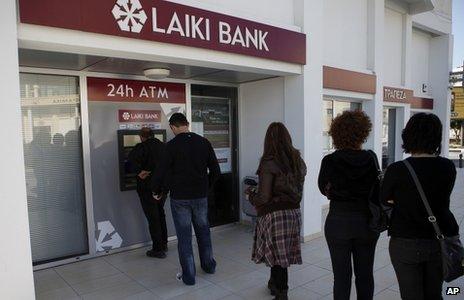Why Cyprus's rescue matters to us
- Published
- comments

People have begun withdrawing savings from Cypriot banks on Saturday morning
Cyprus may be one of the eurozone's tiniest economies - its third smallest - but for the next 48 hours or so, it may be the single currency area's most important.
The point is that there could be serious repercussions for other financially over-stretched economies, such as Spain's and Italy's, from the nature of Cyprus's 10bn-euro (£8.7bn) bailout - which includes, for the first time in any eurozone rescue, losses imposed directly on depositors in banks.
These losses, running to almost 6bn euros, stem from an emergency levy of 9.9% on bank deposits over 100,000 euros (£86,600) and 6.75% below that.
The levy serves as a caution to lenders to banks that they should take care where they place their funds and avoid banks which overstretch themselves - as Cypriot banks did.
But precisely the same arguments - for what is known as a "bail-in" by private-sector creditors - were put by liberal-market purists at the peak of the banking crises in Ireland and Spain.
In the end, eurozone governments were terrified that if lenders to Spanish and Irish banks were punished, there would be a devastating domino effect of withdrawals of funds from banks in other weaker economies - a domino effect that would jeopardise the survival of the eurozone.
So, reckless lenders to Spanish and Irish banks were not punished.
Fragile confidence
Why has the precedent been set with lenders - many of them Russian - to Cyprus's banks?
Partly because there is a widespread view that if caveat emptor should apply to well-heeled lenders to banks, then the lesson has to be taught some time.
And partly because of the hope and expectation that sufficient confidence has returned to economies with weakened banks, especially those of Spain and Italy, that those with big deposits in such banks will not immediately ask for their money back (even if the Cypriot levy could one day turn out to be a very painful precedent for them).
Now, it is true that the European Central Bank's deeds and words over the past year - the provision of emergency longer-term loans to eurozone banks and an offer of support to governments with clear plans to restore financial credibility - has staunched the worrying drain of funds out of Spanish and Italian banks.
But investors' confidence remains fragile. The ECB is regarded as having provided a sticking-plaster rather than a cure for what ails the eurozone. Italy is some way from having a stable government with a plan to fix its finances and uncompetitive economy. Many believe that Spain's banks have still not owned up to the full scale of the losses they face on reckless lending to property developers and businesses.
It is possible that Spanish banks, in particular, could be hit by an outflow of deposits. That would reinforce their dependence on emergency funding from the European Central Bank, which would act as further brake on the ability of Spanish banks to provide vital credit - and would represent a serious setback in the stabilisation of the currency union.
But if such an increase in financial stress is not caused by the spanking of Cypriot bank creditors, perhaps that should be seen as evidence that the acute financial phase of the euro crisis is over.
UPDATE 14:20: A well-placed official rings to tell me why investors should not be panicking that the punishment of Cypriot depositors is a precedent, or that lenders to Spanish and Italian banks will be spanked as well before too long.
He says the structure of the Cypriot bailout has been determined by German politics. (Aren't all eurozone bailouts fixed in that way?)
Here is the logic behind imposing a hefty levy on Cyprus deposits, according to this official:
1) Regulators and politicians are convinced that a vast amount of cash in Cypriot banks belongs to Russian money launderers.
2) Few German politicians of any persuasion would have voted for a Cyprus rescue that simultaneously rescued these launderers.
3) So the only way to get the bailout through the Bundestag is for the launderers to be taxed to the tune of almost 10% of their allegedly ill-gotten cash. And if innocent savers are hurt too, that is the way this particular "Keks" will crumble.
On that analysis, private sector lenders either to Spanish banks or to the Italian government - as two topical and relevant examples - need not fear that it is their turn next to take a write-off.
That may be seen as comforting by investors, up to a point.
Except that if we are to see the Cypriot rescue as a very public statement that "hot money", which might be deemed to be laundered, has no place in the eurozone, then this money may well be withdrawn from wherever it sits in the currency union.
And although that might be a great thing from the point of view of the ethical standing of the banking system, it is never nice or easy for any bank to see a vast amount of cash walking out the door - especially since, as I mentioned earlier, that can increase its dependence on emergency replacement finance from the European Central Bank.
Cash does not know where it comes from. But it is a toss-up for any bank whether it is preferable to be kept alive by laundered cash or cash lent by the state via a central bank. Being dependent on either source is not a sign of health.